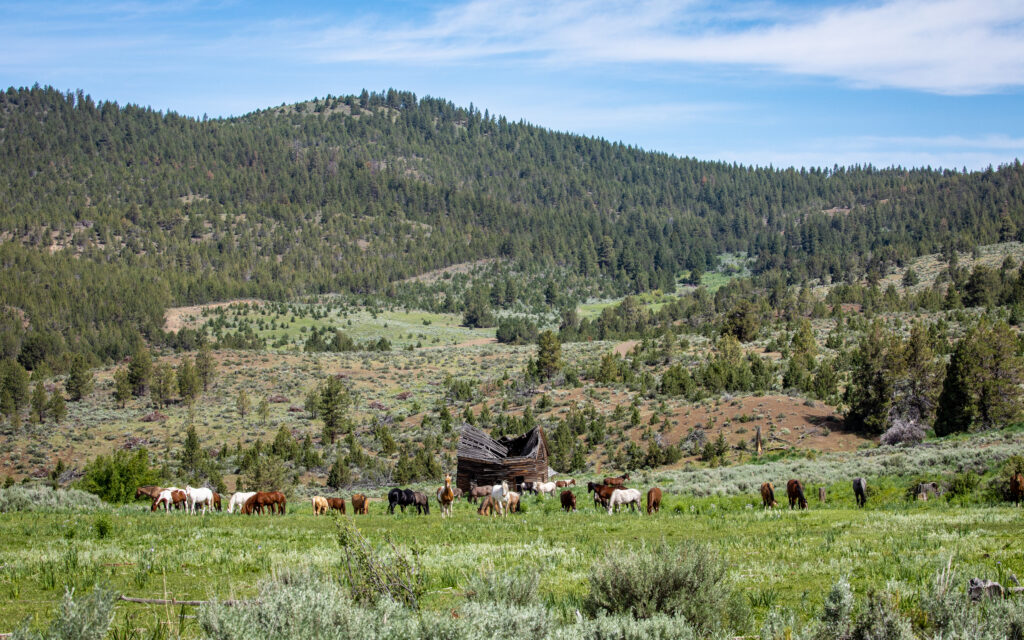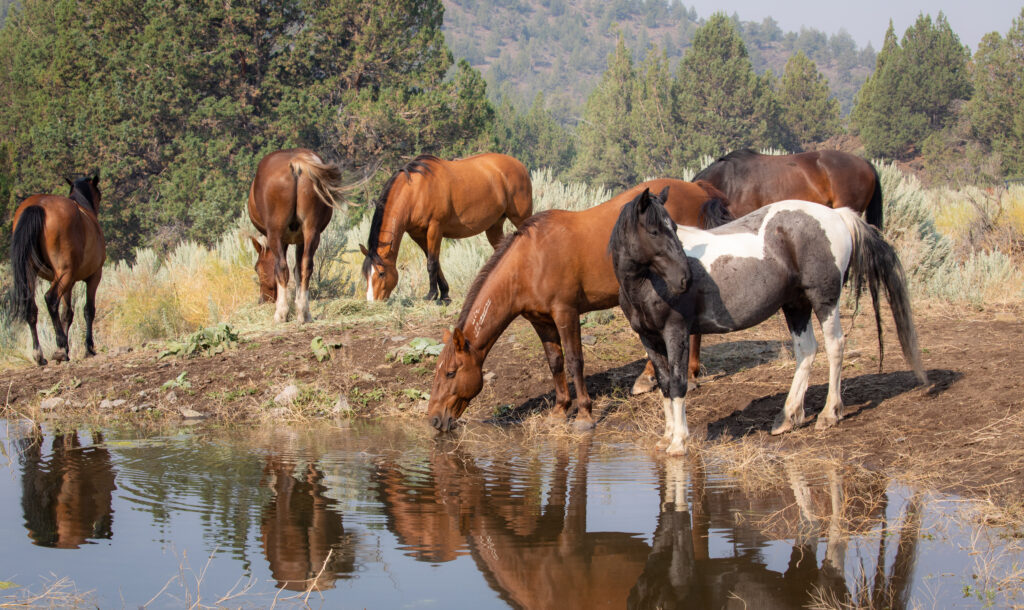
Nestled in the picturesque hills of Malibu, California, lies a sanctuary like no other—Skydog Ranch. Founded and created by passionate animal advocate and changemaker Clare Staples, Skydog Ranch is not just a place, but a labor of love, compassion, and dedication towards the preservation of one of America’s most iconic animals—mustangs.
As the billowing clouds drift above the rolling hills of Skydog Ranch, the mustangs and petite yet dignified donkey named Bootsy leisurely roam, their spirits finally unburdened from fear and suffering. Appraoaching the Mission-style estate, adorned with terracotta roof tiles, weathered paint, and a grand staircase, tranquility pervades the surroundings—serene and harmonious, an unruffled airspace, a blissful escape from my downtown Los Angeles condo. Overflowing with gratitude, knowing she is effecting positive change in the lives of these extraordinary creatures, Staples warmly greets me at the ranch, her vibrant speckled Great Dane galloping by her side.
At Skydog Ranch, every mustang has a unique tale, a cherished name, and a future full of promise. Staples and her team work tirelessly to rescue, rehabilitate, and rehome mustangs that have been neglected, abused, or face the grim fate of slaughterhouses. Yet, just as each mustang embodies a captivating narrative, so too does Staples herself. And it is one of remarkable inspiration.
Growing up in England, Staples had always harbored a deep admiration for horses. They were her safe haven amidst the chaos of life. She found solace in the elegant creatures from a young age, spending hours assisting at the local stables, entranced by their grace and beauty. However, one day, she strolled past the stalls, meticulously undoing each rusty bolt and releasing the horses out into the fields. Upon her mother’s intervention, Staples defended her actions, insisting that the horses wanted to be free. Now, at the age of 60, Staples remains steadfast in her pursuit, devoted to a cause greater than she could have ever imagined.
Throughout her life, horses have always been a constant presence for Staples. However, her previous lifestyle was worlds away from her current reality. As she matured, Staples left her home in the United Kingdom for America, chasing a romanticized image of the dashing cowboys she had watched on television shows like The Virginian and Little House on the Prairie. But instead, she began settling upon a new career. Flourishing as a high-profile model in the bustling metropolis of New York, Staples found herself immersed in the glamorous world of the elite, dating rock stars, partying on yachts, and cultivating an existence steeped in superficial joy. She mistakenly believed that happiness could be found in a specific weight, a particular companion, a bigger home, or a designer handbag. But these yearnings only led to emptiness.
“It’s kind of a human condition that when you have one nice thing, it’s not enough,” Staples said. “You just end up wanting more.” Craving a lasting joy and true happiness, Staples envisioned a new life filled with fulfillment by purchasing land, sheltering horses, and growing old under the shade of a tree, watching them freely frolic around her.
Upon relocating to Los Angeles, the idea of Skydog Ranch and Sanctuary truly began to manifest. Despite being surrounded by the fast-paced, dazzling lifestyle of the rich and famous, Staples still felt a deep longing that only continued to grow. In her recent book Wild Horses of Skydog: Blue Zeus and Families, she reflected on this feeling, writing, “Something was missing, gnawing at my insides and pulling at my heart.”
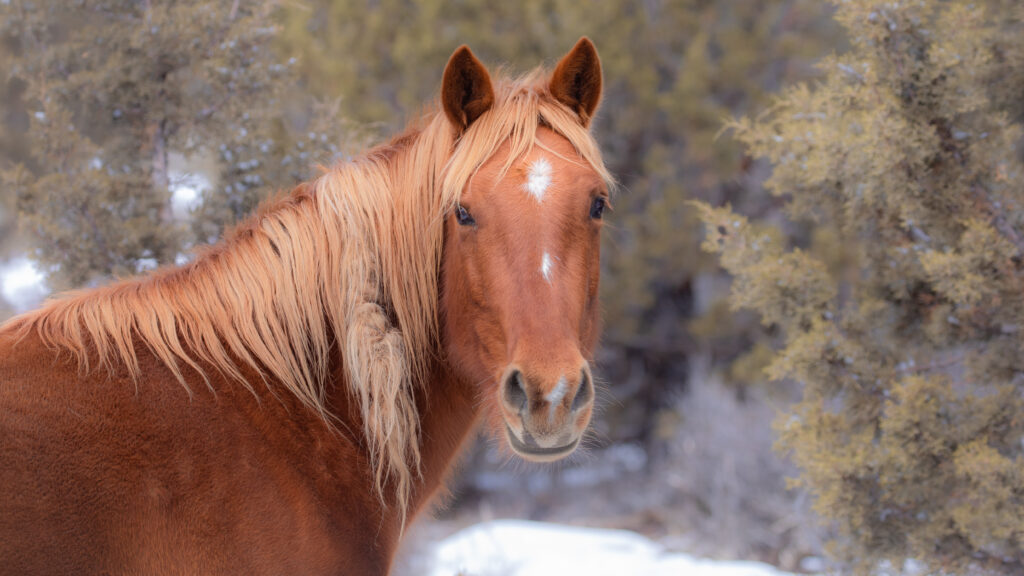
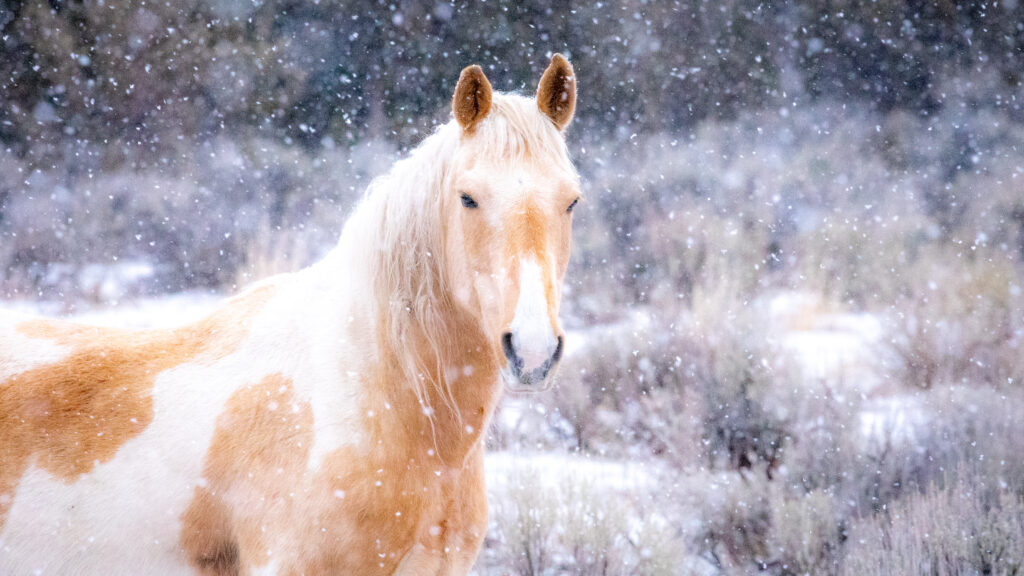
One day while strolling through Beechwood Canyon with her dog, she encountered a group of people horseback riding and followed them to a stable called Sunset Ranch. A few weeks later, at a party with television presenter Cat Deeley, Deeley mentioned she had a horse at that ranch and suggested that Staples come riding sometime. Taking her word, Staples ventured to the ranch where she discovered her dream horse, a golden Mustang named Buddy. Wasting no time in acquiring Buddy for herself, Staples began to feel a newfound sense of purpose. This magnificent animal had an effortless way of filling the void that she had attempted to satisfy with material possessions and fleeting relationships. The bond formed with Buddy not only marked a turning point in her life, but also became a driving force in her journey towards sobriety.
“I had gotten sober and I wanted to be of service, which is a huge part of recovery,” she said. “I really looked at my life and thought, what would I like to do with the second half of it? I wanted it to be something really meaningful. I had already saved two or three horses at that point and after I went down the rabbit hole of how many mustangs were in need, I told my husband we were going to need a bigger ranch.” In her book, Staples recounts the unforgettable tale of Buddy, whose hoofprints were the first to grace the sacred grounds of the sanctuary. His innate leadership qualities quickly established him as the guiding light, aiding in the integration and rehabilitation of the wild horses brought to Skydog Ranch during its first year.
“There was something so sustainable about the joy of rescuing these animals who were in such terrible circumstances, and bringing them back to life,” she said. “Seeing the light back in their eyes and receiving the unconditional love they gave was so rewarding. I used to be embarrassed to say that I was a model because, I mean, sure, there is skill to it, knowing your angles and everything, but I couldn’t really go home at night and be happy knowing I sell useless shit in magazines because my eyes and mouth or physical traits are arranged in an appealing way. I couldn’t take a sense of pride in that.”
As Skydog Ranch began to take shape, Staples delved deeper into her research, gradually expanding her efforts to rescue and reunite horses with their families—among them, the remarkable Blue Zeus. A task of immense willpower, Blue Zeus emerged as her north star. Amid the pandemic, he and his family were captured and taken to a high-security men’s prison in Colorado during lockdown. Following his journey closely, Staples and Janelle Hight, Skydog’s Equine Director, set out to Cañon City in search of the striking mustang, uncovering him in a corral, emaciated and worn. With a mere bid of $25, Blue Zeus was rescued and brought under her care, but Staples did not stop there. After a challenging endeavor, she successfully located his beloved mare Nike and each of his offspring. Bringing the family back together at her Oregon ranch, Staples’ efforts were documented by The Dodo, a digital publisher focused on sharing animal’s stories.
“Everyone fell in love with Blue Zeus,” Staples said. “We saved more horses during the pandemic than ever before. Our stories had happy endings and because people were trapped in their homes at the time, they were able to resonate with the horses in a way, seeing them get their freedom back. It was so healing for a lot of people. We have just grown so quickly.”
Regardless their iconic status in American culture, mustangs face numerous threats to their survival. From overpopulation and habitat loss to roundups and unjust slaughter, these wild horses are fighting for their place in a rapidly changing world. Clare Staples and Skydog Ranch are on the front lines of this battle, advocating for the rights and welfare of mustangs and working towards long-term solutions to ensure their continued existence.
Throughout the vast expanse of America, it is abundantly clear that equine companionship is deeply ingrained in the cultural fabric. It is a timeless truth that the realm of horse trading bears a tarnished reputation, plagued by associations with deceit and thievery. Horse traders, as kill buyers, have been known to employ elaborate lies and schemes in order to secure these horses at a fraction of their true worth only to peddle them for profit. Unfortunately, these unethical practices persist to this day, extending into the racehorse industry and even to the innocent ponies cherished by children at summer camps.
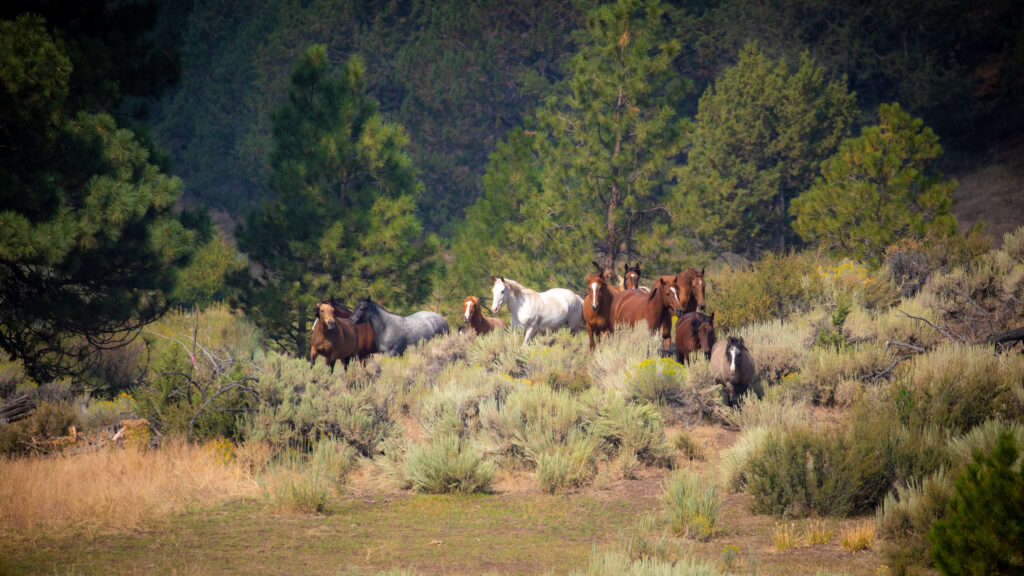
“Most of these horses end up at livestock auctions,” Staples said. “Some people genuinely want to buy them for good reasons, but the worst part is the traders going around looking for these horses for cheap and telling lies to get them.” When pressed for further insight into the motives driving the exploitation of these innocent animals, Staples’ reply was hard to stomach.
The cost of meat per pound on a horse is approximately $400. The horses are weighed and then paid for by pound before being shipped to massive slaughter plants in Mexico or Canada. Then, contracts are established to transport a select number of horses for the purpose of human consumption, with an average of 200 horses per shipment. In the past, an alarming 150,000 horses were being shipped to slaughter annually. However, according to the American Society for Prevention of Cruelty to Animals, in 2023, that number decreased to around 20,000.
“In a lot of European countries mostly, people eat horse steak and that’s where a lot of it goes,” Staples said. “It’s also for their hides to make fancy purses. Donkeys are used for their hide as well. It’s usedin traditional Chinese medicine to make a remedy called ejiao. They also boil the bones and make gelatin out of it, which is found in things like gummy bears or Red Vines. We take a certain amount of the horses, mostly branded mustangs, that are in the slaughter pipeline, but there are so many in overcrowded holding facilities. It’s horrible.”
While establishing a thriving community at Skydog Ranch, Staples has spent the last decade meticulously observing these exceptional animals. She describes the mustang as a special horse breed that is characterized entirely by the land in which they are born on. Mustangs possess a distinct advantage over other breeds, with a rugged edge that sets them apart. Known for their strength, endurance, and intelligence, their street smarts far surpass those of your typical stable-raised horse, traits that have been honed through generations of survival in the most unforgiving terrains.
“They have a natural intelligence to stay alive,” Staples said. “Back in the day, there were over two million mustangs across America. There is so much history, almost a debt we have to the horses because they got us from East to West. They went to war with us. They pulled the plow. We uses them to get everywhere. Sadly, our lives our different now. No one wants a horse unless it’s to compete or ride for fun. And now they are being left behind, slaughtered, or put in holding pens for the rest of their lives. It’s a shame and a betrayal to them. I just want people to fall in love with horses again and to realize what incredible, sentient beings they are.”
In the grand scheme of things, what sets Skydog Ranch apart is not just its beautiful landscape or tranquil surroundings. It is the profound connection that Staples shares with the mustangs, evident in her compassionate gaze, unwavering efforts for their well-being, and impassioned advocacy for their protection. The sanctuary is a place of healing and transformation, where horses are given a new lease on life in the same way they’ve given Staples a second chance at a purposeful one. Through gentle rehabilitation and patient care, the mustangs at Skydog Ranch are able to experience joy, freedom, and a sense of belonging that they may have never known before.
“There is an irony about the fact that we rescue these horses and they turn around and rescue us right back,” Staples said. “I’m in recovery and do a lot of work around that, but ultimately, it’s the horses I go to. My spirituality comes and goes in these beautiful moments, when no one else is around, when I’m untangling a horses mane and watching her let her guard down. There is such an extraordinary exchange in energy there, doing something not for myself, but for the comfort of another being. I’m more me now than I’ve ever been my entire life.”
